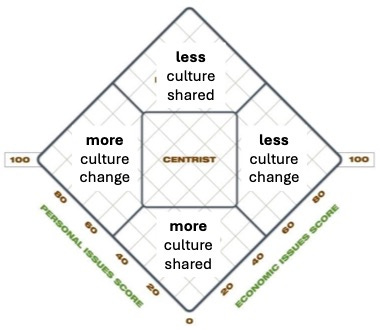Libertarianism As Deep Multiculturalism
A shallow “multiculturalism” tolerates and even celebrates diverse cultural markers, such as clothes, food, music, myths, art, furniture, accents, holidays, and dieties. But it is usually also far less tolerant of diverse cultural values, such as re war, sex, race, fertility, marriage, work, children, nature, death, medicine, school, etc. It seeks a “mutual understanding” that that we are (or should be) all really the same once we get past our different markers.
In contrast, a deep “multiculturalism” accepts and even celebrates the co-existence of many cultures with diverse deeply-divergent values. It seeks ways for a world, and even geographic regions, to encompass such divergent cultures under substantial peace and prosperity. It expects some mistrust, conflict, and even hostility between cultures, due to their divergent values. But it sees this as the price to pay for deep cultural variety.
Ancient empires were closer to deep multiculturalism, as empires then interfered little in local cultures, beyond assuring loyalty to the empire in taxes and war. But then nation-states arose by suppressing local cultures in favor of national cultures, whose stronger national communities helped them to win wars. Furthermore, the last century has seen the rise of a global culture, especially among world elites, that discourages nations from defying world elite values. So the “multiculturalism” we see today is rather shallow, much more about cultural markers than values.
On Twitter/X, I recently asked “Hey libertarians, what is your best explanation for why the world is not far more libertarian now?” and got 406 quite diverse replies. In 1237 poll responses, the modal 48% answer was “Ordinary folks dislike libertarian policies”, and when asked why this, in 882 responses the modal 40% answer was “Share govt = are a community, should share morals & help each other”.
That is, the most common opinion, with which I agree, is that most people think that those who share a government should also sharing a community with a shared culture. As most non-libertarian government activities are mainly justified as creating and maintaining shared communities/cultures and their values, this urge to use government to promote shared culture seems the main obstacle to libertarian-style governance. That is, libertarians hope to share a government without sharing a community or culture.
For example, communities help each other, hence redistribution. Communities socialize their kids together, hence government schools. Communities suppress what violations of their culture’s morals, hence laws against abortion, gambling, drugs, prostitution, etc. Communities police membership, hence immigration limits. Communities guide members into preferred activities, show respect for those who their values say are prestigious by granting them extra discretion and powers, and put on notice those their values dislike by giving others extra powers over them, hence regulation and professional licensing.
In The Collapse of American Criminal Justice, William Stuntz describes how US law started out giving great freedom to local jurisdictions to have different laws, but then a long serious of moral campaigns, such as re drugs, alcohol, prostitution, and slavery, induced US Supreme Court rulings that forced the whole nation to support each newly dominant moral stance on these issues. US law now enforces a US culture.
In Anarchy, State, and Utopia, philosopher Robert Nozick imagined “utopia” as a world where people can freely enter and leave specific communities embodying particular attempts to create utopias, where that larger world little constrained individual community policies and cultures. Later, however, Nozick recanted in part due to seeing that his vision “neglected the symbolic importance of an official political concern with issues or problems”. That is, we must only seek utopias that embrace our shared culture’s values.
The usual “libertarian” vs “statist” political axis might be seen as an axis re how much we want to share culture, versus allow divergent cultures. And the usual “left” vs “right” political axis might be seen as about more versus less cultural change. If so, we might describe the usual two dimensional political space in these cultural terms:



So this is where both ends of the conventional political spectrum disagree with libertarians , and why. They agree with each other that culture cannot/should not be separate from government and forced down the throats of any dissidents, they just disagree what cultural content it should be that we all must swallow.
I don't think it really makes sense to rank empires/civilizations as more or less tolerant of different cultures in general the way you do -- it's really a notion that only makes sense relative to a particular range of cultural variation.
For instance, ancient Rome seems really tolerant relative to the expectations of the ancient world but once you have monotheistic cultures who have really strong prohibitions against worshipping other gods the requirement that you pro-forma worship the emperor as a god goes from no big deal to hugely oppressive.
More generally, many cultures are deeply intolerant of various practices. Our western culture is extremely intolerant of paedophilia and if we were governed by an empire who demanded we not do anything to stop rich men offering our young teen children money for sex they'd likely need force to keep us in line.
I'd argue the appearance of tolerance is really just a particular cultural acceptance of a particular range of variation and it's not at all clear that most cultures aren't in some sense incomparable on such measures .